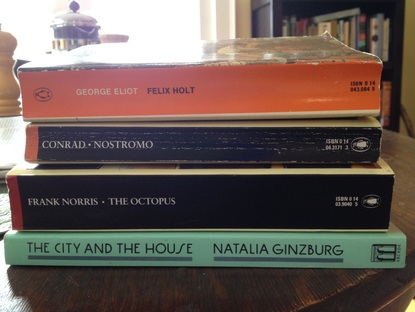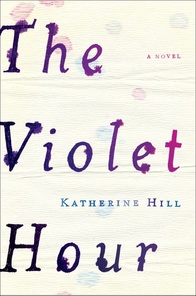|
A visit to Commonwealth Books in Boston yesterday yielded four used paperback novels: George Eliot's Felix Holt: The Radical, Joseph Conrad's Nostromo, Frank Norris's The Octopus, and Natalia Ginzburg's The City and the House. To pass time on the T ride home, we read the first sentence of each, not expecting them to have much in common.  "Five-and-thirty years ago the glory had not yet departed from the old coach-roads; the great roadside inns were still brilliant with well-polished tankers, the smiling glances of pretty barmaids, and the repartees of jocose ostlers; the mail still announced itself by the merry notes of the horn; the hedge-cutter or the rick-thatcher might still know the exact hour by the unfailing yet otherwise meteoric apparition of the peagreen Tally-ho or the yellow Independent; and elderly gentlemen in pony-chaises, quartering nervously to make way for the rolling swinging swiftness, had not ceased to remark that times were finally changed since they used to see the pack-horses and hear the tinkling of their bells on their very highway." George Eliot, Felix Holt "In the time of Spanish rule, and for many years afterwards, the town of Sulaco--the luxurious beauty of the orange gardens bears witness to its antiquity--had never been commercially anything more important than a coasting port with a fairly large local trade in ox-hides and indigo." Joseph Conrad, Nostromo "Just after passing Caraher's saloon, on the county road that ran south from Bonneville, and that divided the Broderson ranch from that of Los Muertos, Presley was suddenly aware of the faint and prolonged blowing of a steam whistle that he knew must come from the railroad shops near the depot at Bonneville." Frank Norris, The Octopus "My dear Ferruccio, I booked my ticket this morning." Natalia Ginzburg, The City and the House Of course, each one was its own unique sentence -- just compare the lengthy Eliotness of Eliot with the epistolary brevity of Ginzburg -- and yet, in a way, they were all the same. Eliot and Conrad make explicit acknowledgment of changing times; Eliot, Conrad, and Norris offer a flavor of commerce and emerging technologies; and in all four, there a presumption, if not an outright declaration, of travel. Eliot has the coach-road, Conrad the port, Norris the county road and railroad, and Ginzburg the ticket. It's a reminder, however superficial (because after all, this was a subway game, and I haven't yet read any further), that fiction thrives on movement: of language, of action, of people. It's an old, facile dichotomy that there are two plots in fiction (a hero goes on a journey, and a stranger comes to town) which is a little too cute. And yet, when someone or something is going somewhere -- when a president heads to the Capitol to embark on another four years -- isn't it true that we can't help but wonder why, or how it will all turn out?
1 Comment
When Courtney Elizabeth Mauk invites you to participate in a literary blog chain called The Next Big Thing, you do it. Even if it means answering a bunch of scary questions about the thing you’ve been working on all these years… Courtney is the author of Spark, a fabulous novel about arson and siblinghood, which was published by Engine Books last fall. She’s also basically the nicest person you’ll ever meet. (On Twitter @courtneymauk.) Thanks for the invite, Courtney! Here goes nothing…  What is your working title of your book (or story)? The Violet Hour What is the one-sentence synopsis of your book? One summer afternoon in San Francisco, a rheumatologist and a sculptor out for a sail with their Harvard-bound daughter plunge into a fight that will change the course of all their lives. What genre does your book fall under? novel, literary fiction Where did the idea come from for the book? I’ve always been interested in intimacy—how fragile it can be and how irrationally strong. But looking back, there was a college seminar I took called “Doomed Love in the Western World” that was probably pretty important. We read about a dozen great novels, including Madame Bovary, Anna Karenina, and The Satanic Verses, and for a long time after that, everything I read seemed to extend the conversation of that class. Whatever else was going on the in world, love just kept finding creative new ways to die. For some reason, probably because I’m a hopeless romantic, that idea really excited me. Which actors would you choose to play your characters in a movie rendition? The most attractive ones, of course. Honestly, I think about celebrities far too often to answer this question without surrendering all dignity. But if pressed, maybe Julianne Moore, Emma Stone and George Clooney. Or three fabulous actors no one has ever heard of! Yes, that. How long did it take you to write the first draft of your manuscript? The first draft took me about four years. Then I spent the next three years revising. Who or what inspired you to write this book? Virginia Woolf. Jonathan Franzen. Oh no, if I keep going this will be like roll call at graduation. Really, just about everyone I’ve ever read. Nothing inspires me more than an ambitious writer tackling an ambitious subject like love, loss, time—or ambition. That, and fear. I’d told so many people I was working on this novel that I think I felt I just had to finish it. What else about your book might pique the reader's interest? A family-run funeral home in Bethesda, Maryland, plays an important role in the action. Will your book be self-published or represented by an agency? Thanks to my hero Jim Rutman at Sterling Lord Literistic, The Violet Hour will be published in July 2013 by Scribner in the US and Canada, Viking/Penguin in the UK, and Ullstein in Germany. I know. I can’t believe it either! Up next week are three writers I really, really like. As people and as writers. Basically, I did this just to get them all to talk, because I'm dying to hear what they're working on. Laurie Ann Cedilnik. Fiction Editor at Third Coast. Assistant Fiction Editor at Barrelhouse. Queens girl for life. On Twitter @cedilnik. Tom McAllister. Author of Bury Me in My Jersey: A Memoir of My Father, Football, and Philly. Nonfiction Editor at Barrelhouse. Co-host of Book Fight podcast. On Twitter @t_mcallister. Ross Simonini. Interviews Editor at The Believer. Member of NewVillager. On Twitter @RoosShamanana. Check back next week for their answers. |
Aboutauthor of The Violet Hour, reader, prodigious eater of ice cream Archives
June 2014
Categories
All
|
 RSS Feed
RSS Feed